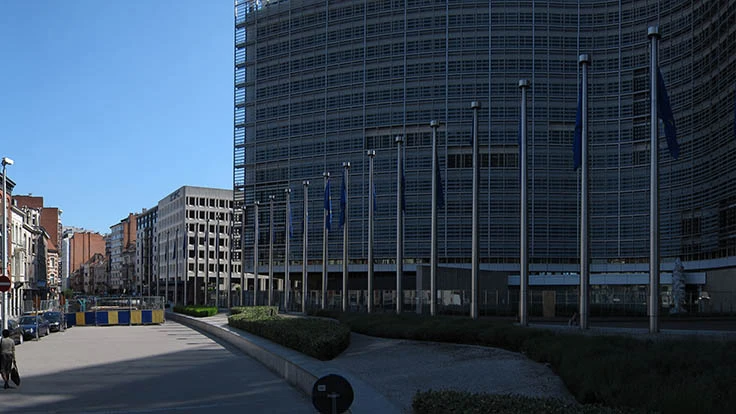
Photo: Thomas Quine via Flickr
The Brussels-based European Commission (EC) has officially adopted the new Circular Economy Package to stimulate Europe’s transition toward a circular economy. The package was adopted Dec. 2 and is expected to boost the European Union's global competitiveness, foster sustainable economic growth and generate new jobs.
The EC says the package is intended to help European businesses and consumers to make the transition to a stronger and more circular economy where resources are used in a more sustainable way. The proposed actions will contribute to “closing the loop” of product lifecycles through greater recycling and re-use, and bring benefits for both the environment and the economy. The plans will extract the maximum value and use from all raw materials, the EC says, fostering energy savings and reducing greenhouse gas emissions.
The proposals cover the full lifecycle from production and consumption to waste management and the market for secondary raw materials. This transition will be supported financially by ESIF (European Structural & Investment) funding, €650 million from Horizon 2020 (the EU funding programme for research and innovation), €5.5 billion from structural funds for waste management, and investments in the circular economy at national level.
The package has been prepared by a core project team co-chaired by First Vice-President Frans Timmermans and Vice President Jyrki Katainen with the close involvement of Commissioners Karmenu Vella and Elzbieta Bienkowska. Many other Commissioners were also involved in its preparation.
First Vice-President Frans Timmermans, responsible for sustainable development, said, “Our planet and our economy cannot survive if we continue with the ‘take, make, use and throw away’ approach. We need to retain precious resources and fully exploit all the economic value within them. The circular economy is about reducing waste and protecting the environment, but it is also about a profound transformation of the way our entire economy works. By rethinking the way we produce, work and buy we can generate new opportunities and create new jobs. With today’s package, we are delivering the comprehensive framework that will truly enable this change to happen. It sets a credible and ambitious path for better waste management in Europe with supportive actions that cover the full product cycle. This mix of smart regulation and incentives at EU level will help businesses and consumers, as well as national and local authorities, to drive this transformation.”
Key actions adopted or to be carried out under the current Commission’s mandate include:
- Funding of over €650 million under Horizon 2020 and €5.5 billion under the structural funds;
- Actions to reduce food waste including a common measurement methodology, improved date marking, and tools to meet the global Sustainable Development Goal to halve food waste by 2030;
- Development of quality standards for secondary raw materials to increase the confidence of operators in the single market;
- Measures in the Ecodesign working plan for 2015-2017 to promote reparability, durability and recyclability of products, in addition to energy efficiency;
- A revised Regulation on fertilisers, to facilitate the recognition of organic and waste-based fertilisers in the single market and support the role of bio-nutrients;
- A strategy on plastics in the circular economy, addressing issues of recyclability, biodegradability, the presence of hazardous substances in plastics, and the Sustainable Development Goals target for significantly reducing marine litter; and
- A series of actions on water reuse including a legislative proposal on minimum requirements for the reuse of wastewater.
The communication also includes a clear timeline for the actions proposed and a plan for a simple and effective monitoring framework for the circular economy.
The revised legislative proposal on waste sets clear targets for reduction of waste and establishes an ambitious and credible long-term path for waste management and recycling. To ensure effective implementation, the waste reduction targets in the new proposal are accompanied by concrete measures to address obstacles on the ground and the different situations across Member States. Key elements of the revised waste proposal include:
- A common EU target for recycling 65% of municipal waste by 2030;
- A common EU target for recycling 75% of packaging waste by 2030;
- A binding landfill target to reduce landfill to maximum of 10% of all waste by 2030;
- A ban on landfilling of separately collected waste;
- Promotion of economic instruments to discourage landfilling ;
- Simplified and improved definitions and harmonised calculation methods for recycling rates throughout the EU;
- Concrete measures to promote re-use and stimulate industrial symbiosis–turning one industry’s byproduct into another industry’s raw material; and
- Economic incentives for producers to put greener products on the market and support recovery and recycling schemes (e.g. for packaging, batteries, electric and electronic equipment, vehicles).
For more information on the Circular Economy package, visit http://europa.eu/rapid/press-release_MEMO-15-6204_en.htm
Latest from Recycling Today
- Cards Recycling, Live Oak Environmental merge to form Ecowaste
- Indiana awards $500K in recycling grants
- Atlantic Alumina partners with US government on alumina, gallium production
- GP Recycling president retires
- Novelis Latchford commissions new bag houses
- UK facility focuses on magnet recycling
- Aduro revenue increases while losses widen
- Worldsteel updates its indirect steel data





